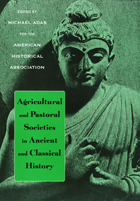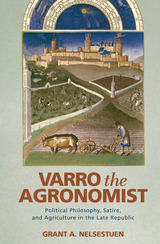2 books about Agriculture, Ancient

Agricultural and Pastoral Societies in Ancient and Classical History
Michael Adas
Temple University Press, 2001
The second volume in the American Historical Association's global history series introduces readers to the cross-cultural study of ancient and classical civilizations. The opening essay by Jerry Bentley surveys methodologies and critical interpretations that have been essential to the development of comparative historical analysis. These include contributions from the fields of sociology, archaeology, linguistics, and anthropology, and recent investigative practices that honor previously neglected groups and validate testimony passed down through oral traditions. The first set of essays highlight predominant themes in global history by examining the ongoing interactions between ancient agrarian and nomadic societies as well as the impact of these exchanges on economic development and cross-cultural adaptation. The essays in the second section focus on regional patterns in the dissemination of ideas, institutions, and material culture.
By highlighting key historical transitions and recurring cultural patterns, this book provides an engaging introduction to the complexities of human development. Written by leading scholars in the field, the historiographic essays in Agricultural and Pastoral Societies in Ancient and Classical History offer students and teachers a comprehensive overview of the arguments, applications, and resources that inform comparative global history.
By highlighting key historical transitions and recurring cultural patterns, this book provides an engaging introduction to the complexities of human development. Written by leading scholars in the field, the historiographic essays in Agricultural and Pastoral Societies in Ancient and Classical History offer students and teachers a comprehensive overview of the arguments, applications, and resources that inform comparative global history.
[more]

Varro the Agronomist
Political Philosophy, Satire, and Agriculture in the Late Republic
Grant A. Nelsestuen
The Ohio State University Press, 2015
Some six years after his narrow escape from proscription in 43 bce, Marcus Terentius Varro, the “most learned” of the Romans, wrote a technical treatise on farming in the form of a satirico-philosophical dialogue. Grant A. Nelsestuen argues that far from simply being just another encyclopedic entry of a seemingly aloof antiquarian or offering an escapist’s retreat into rustication, Varro’s De Re Rustica uses the model of the farm to craft an implicitly political treatise that grapples with multifarious challenges facing the contemporary Roman world.
On one level, Varro’s treatise presents an innovative account of the Roman farm, which rationalizes new agricultural and pastoral opportunities for contemporary elite owners of large-scale estates. But on another level, this bold agronomical vision associates the farm’s different spheres with distinct areas under Roman control, thereby allegorizing Rome’s empire on the model of a farm. Nelsestuen argues that Varro’s treatise thus provides his contemporaries with a model for governing the Roman state, anticipates Augustus’ subsequent transformation of Roman dominion into a coherent territorial state, and offers an ancient theory of imperialism.
Shedding new light on the only completely extant work of a much-celebrated but ill-understood figure, Varro the Agronomist has much to offer to those interested in Latin literature—especially, Cicero and Vergil—as well as on the political dimensions of intellectual life in first-century bce Rome, ancient imperialism, and Roman political philosophy.
On one level, Varro’s treatise presents an innovative account of the Roman farm, which rationalizes new agricultural and pastoral opportunities for contemporary elite owners of large-scale estates. But on another level, this bold agronomical vision associates the farm’s different spheres with distinct areas under Roman control, thereby allegorizing Rome’s empire on the model of a farm. Nelsestuen argues that Varro’s treatise thus provides his contemporaries with a model for governing the Roman state, anticipates Augustus’ subsequent transformation of Roman dominion into a coherent territorial state, and offers an ancient theory of imperialism.
Shedding new light on the only completely extant work of a much-celebrated but ill-understood figure, Varro the Agronomist has much to offer to those interested in Latin literature—especially, Cicero and Vergil—as well as on the political dimensions of intellectual life in first-century bce Rome, ancient imperialism, and Roman political philosophy.
[more]
READERS
Browse our collection.
PUBLISHERS
See BiblioVault's publisher services.
STUDENT SERVICES
Files for college accessibility offices.
UChicago Accessibility Resources
home | accessibility | search | about | contact us
BiblioVault ® 2001 - 2024
The University of Chicago Press









